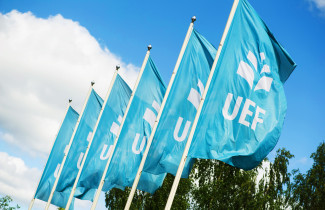The doctoral dissertation in the field of Computer Science will be examined at the Faculty of Science and Forestry at the Kuopio campus and online.
What is the topic of your doctoral research?
There is a need for new tools to gain insights from data in business practices. However, there is an ongoing research gap in assessing possibilities for data manipulation technologies and tools. For example, what benefits they offer to manifest insights from data, what they can automate and are there any, how they affect human behaviour. Deployments of new technologies are being delayed due to a lack of understanding of process phases, from attractive or unknown items to impact assessments. This dissertation topic concerns the ways to find the correspondences between human cognition and cognitive services and strengthen human understanding in cognitively computed insights. It approaches the ways to evaluate the effects of cognitively computed knowledge on organisations. The dissertation frames the cognitively computed insights and proposes proofs of concept by cognitive services. Cognitive services can be integrated into solutions of different kinds, and they are strongly related to human cognitive functions.
What are the key findings or observations of your doctoral research?
This dissertation highlights the exploration of automation capabilities and human cognition to help discover meaningful use cases for cognitive services. Proofs of concept are required to determine whether something fits purpose and use. In general, organisations must know what to use, what can be gained, and how to assess and amplify technology adaptions. The significant contributions concerning framing cognitively computed insights are the functional hierarchy of cognitive functions and the utilisation mindset. These constructions help with comparison and thus the evaluation of the impact of the applications. For example, they are helpful in organisational duality in between exploration and exploitation, estimating impact, and illustrating how automation releases sources with or without human intervention.
How can the results of your doctoral research be utilised in practice?
The organisations must experiment to find their competitiveness and effectiveness when they adopt objective insights with the help of cognitive services. In practice, it is essential to know whether cognitive services can realize the required cognitive abilities. The dissertation gives practical examples and advice in the following ways:
- List the needed jobs and assess what kind of cognitive abilities are required,
- Divide the activities' functionalities into simple functions as building blocks since human cognition results from multi-functional cooperation,
- Use the framework for the functional hierarchy of cognitive functions and find the correspondences of functionality between cognitive service and human cognition,
- Use utilisation mindset to clarify the automation possibilities,
- Amplify human cognition by showing transparent results from raw data to insights.
The outcomes of the cognitive services as building blocks can be implied to construct more significant functional entities. This dissertation gives practical advice, for example, in the following ways:
- List work activities and evaluate whether they will be automated using cognitive services,
- Functionality can be reconciled with human cognition, thus helping find the necessary reinforcements that correspond to human understanding.
To assess impacts of the cognitively computed insights can be practically aproached, for example, in the following ways:
- List key questions concerning business analytics and determine whether there are cognitive services that can be used to provide answers for the questions,
- Manifest personality traits of employees and other representatives of the stakeholders and they can be used to manage behaviour or to plan better experiences concerning interactions of different kinds,
- Cognitive services can enhance manifest transparent data-driven objectives,
- List work activities and evaluate whether they will be automated using cognitive services,
- Assess the impact of the cognitive functions in applications between new building blocks or technology and earlier systems in place.
What are the key research methods and materials used in your doctoral research?
The main results included 20 constructions: four abstractions, seven experiments, three frameworks, and six mappings. The term "construction" refers to a typed entity, the types of which are abstraction, experiment, framework, and mapping. The main meanings of the typed constructions are vocabulary-based, and their meanings are illustrated in the dissertation as follows: abstraction is relevant information used to highlight a specific purpose; experiment is a purposive investigation to gain experience and pieces of evidence; the framework is a set of reusable elements used to guide solution-focused development, and mapping is an assigned correspondence between two entities to explain differences and similarities. The constructions were established within existing frameworks, which helps reveal interest in the focus of this dissertation. The constructions were the result of adapting several frameworks concerning automated machine learning (e.g., Pycaret), brain models (3D Brain, the layered reference model of the brain), business model canvases (e.g., the value proposition canvas), McKinsey's automation capabilities, personality traits and types (global vectors for word representation, International Personality Item Pool), and value propositions (e.g., Bøe-Lillegraven's ambidexterity value chains). Moreover, the following cognitive services exemplify the constructions: IBM Personality Insights, IBM Tone Analyzer, IBM Natural Language Understanding (previously Alchemy Language), IBM Retrieve and Rank, IBM Tradeoff Analytics, IBM Discovery, IBM Visual Recognition, and Microsoft Speaker Recognition
The doctoral dissertation of Ulla Gain, MSc, entitled Framing of cognitively computed insights Proofs of concept by cognitive services will be examined at the Faculty of Science and Forestry, Kuopio Campus, Snellmania, SN201, and online, on 18 February at 12 noon. The opponent will be Associate Professor Sanna Kumpulainen, University of Tampere, and the custos will be Professor Pekka Toivanen, University of Eastern Finland. Language of the public defence is Finnish.
For further information, please contact:
Ulla Gain, [email protected], p. 040 051 7747



